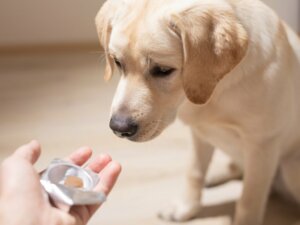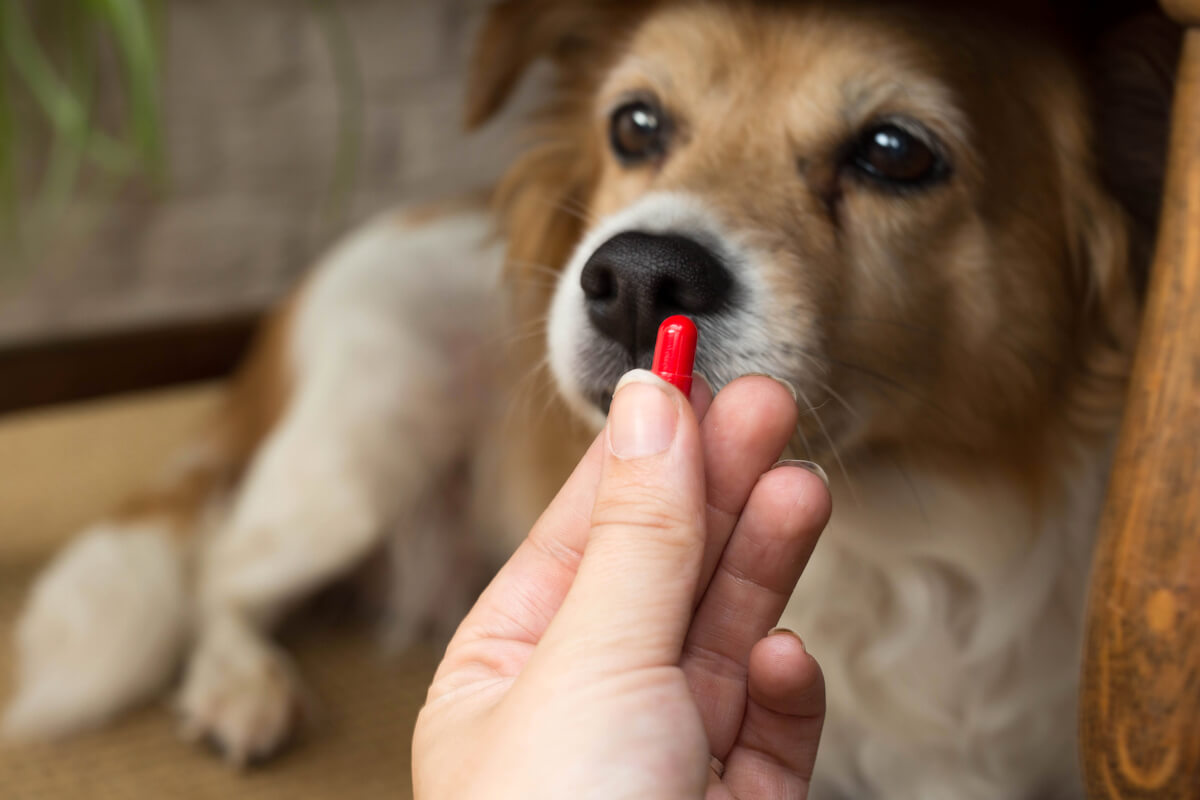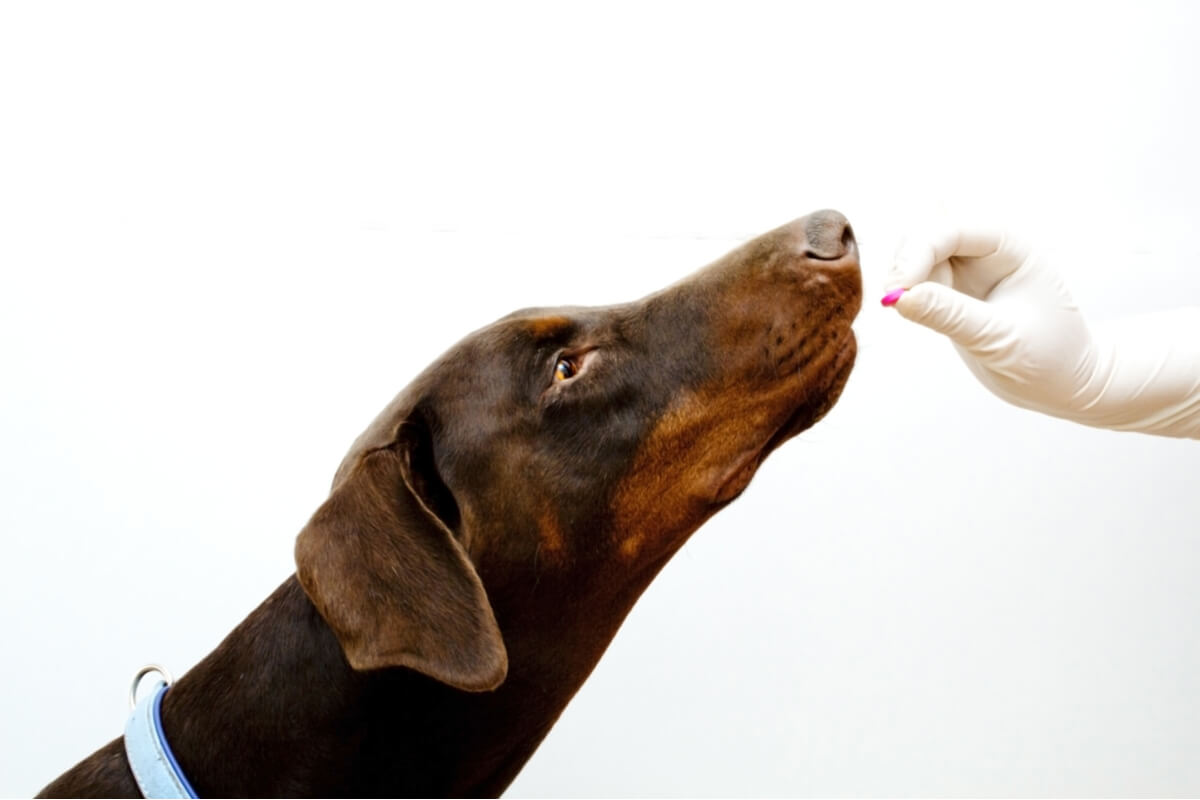Sucralfate in Dogs: Dosage and Contraindications


Reviewed and approved by the biologist Samuel Sanchez
On certain occasions, dogs suffer gastrointestinal lesions that must be treated with drugs, such as gastric ulcers in the esophagus or in the duodenum. In these cases, sucralfate in dogs may be the recommendation to cure them.
Of course, like any medicine, sucralfate in dogs should be recommended by a veterinary professional, after checking the animal and after an analysis of its situation. Next up, we invite you to get to know everything you need to know about this drug.
What’s sucralfate for dogs?
Faced with any type of health problem that may occur in a pet, it’s advisable to not only go to the vet to be treated, but to have as much information as possible about the problem and the recommended treatment. In this case, we’ll explain what sucralfate is and what it’s used for.
As we’ve explained, this is an antiulcer drug, which produces a cytoprotective effect on the gastric mucosa. This releases aluminum hydroxide and acts by creating a barrier, after producing a deposit that spreads over gastric lesions. In this way, it covers the area that has lost mucosa and the superficial epithelium, avoiding irritation due to gastric acid.
You can purchase this drug by prescription as an oral suspension and as a tablet, whatever the vet thinks is most advisable. In addition, you need to take into account the dog itself. For example, some dogs have a harder time taking tablets than gels. The owner must provide this information.

What is sucralfate for in dogs?
Its use is indicated to treat oral, gastric, esophageal (such as reflux esophagitis) and duodenal ulcers, tumors in the digestive system, as well as to cure postsurgical trauma. It’s also quite efficient in dogs that suffer from chronic liver or kidney problems, as these conditions often cause gastrointestinal ulcers.
In addition to this, you can use it to prevent some gastric injuries caused by medications. Ulcers are very common in dogs that receive, over a long period of time, steroidal and non-steroidal anti-inflammatory drugs. In these cases, sucralfate in dogs isn’t only used to treat them, but to prevent them.
On the other hand, in addition to protecting, the drug also acts, although to a lesser extent, as a neutralizer of acidity. This is so because it releases aluminum from the areas near the injury, as if it were a local antacid.
Sucralfate dosage for dogs
The union with the gastric mucosa that occurs when sucralfate is administered lasts for 6 hours, and after 24 hours of a single dose, there are usually no traces of the drug in the area. Knowing this, the doses will vary based on two main issues:
- The presentation of the medicine (oral suspension or tablet)
- The dog’s weight
As indicated by experts, sucralfate in dogs by oral administration will be given in a low dose at 1 milliliter per 12 kilos, and in high doses, 1 milliliter per 6 kilograms. Even so, it’s up to the veterinarian to determine if this is the appropriate dose or if it needs to be raised or lowered.
In the same way, the professional will also establish the total duration of the treatment. This will depend on why the treatment was initiated and the condition of the pet. Typically it will range from two days to two weeks. Finally, an issue to keep in mind when applying the doses is that they should normally be on an empty stomach.
Contraindications of sucralfate in dogs
The administration of this medicine doesn’t have excessive contraindications, but, even so, there are some in certain cases. We’ll summarize them in the following list:
- Dogs that have already shown sensitivity to this drug.
- Pregnant bitches. In puppies, there are no contraindications.
- Dogs that suffer from constipation problems, as this will complicate the situation.
- It isn’t contraindicated, but you need to be cautious with dogs that have reduced intestinal motility.
- You must exercise caution must if the dog is taking other drugs, as it may delay or partially inhibit its absorption. It’s important to inform the vet in that case.
Side effects of sucralfate in dogs
The side effects from taking this medicine are generally very mild and transitory. The main side effect of sucralfate in dogs is mild constipation due to continued use. In a low percentage of cases, other types of symptoms could appear, such as the following:
- Vomiting
- Diarrhea
- Itches
- Gases
- Urticaria
- Indigestion
- Sickness
- Drowsiness
- Dry mouth
- Stomach ache
What if I forget to give my dog the medicine?
As the professionals indicate, if you miss a dose you can give it to your dog when you remember, unless you are very close to the next corresponding dose. In that case, you should skip the missed dose and give the next one at its scheduled time.
What you should never do is give double or additional doses to those that the vet indicates. On the other hand, you shouldn’t stop giving the medicine before the prescribed time if it isn’t advised by a professional.

Sucralfate is a safe drug as far as its use in dogs is concerned, not like other drugs. Even so, it’s important to note that you should never choose to self-medicate a pet without having veterinary knowledge. The fact that a dog has never presented symptoms before certain treatments doesn’t imply that it won’t suffer an adverse reaction when taking one drug or another.
On certain occasions, dogs suffer gastrointestinal lesions that must be treated with drugs, such as gastric ulcers in the esophagus or in the duodenum. In these cases, sucralfate in dogs may be the recommendation to cure them.
Of course, like any medicine, sucralfate in dogs should be recommended by a veterinary professional, after checking the animal and after an analysis of its situation. Next up, we invite you to get to know everything you need to know about this drug.
What’s sucralfate for dogs?
Faced with any type of health problem that may occur in a pet, it’s advisable to not only go to the vet to be treated, but to have as much information as possible about the problem and the recommended treatment. In this case, we’ll explain what sucralfate is and what it’s used for.
As we’ve explained, this is an antiulcer drug, which produces a cytoprotective effect on the gastric mucosa. This releases aluminum hydroxide and acts by creating a barrier, after producing a deposit that spreads over gastric lesions. In this way, it covers the area that has lost mucosa and the superficial epithelium, avoiding irritation due to gastric acid.
You can purchase this drug by prescription as an oral suspension and as a tablet, whatever the vet thinks is most advisable. In addition, you need to take into account the dog itself. For example, some dogs have a harder time taking tablets than gels. The owner must provide this information.

What is sucralfate for in dogs?
Its use is indicated to treat oral, gastric, esophageal (such as reflux esophagitis) and duodenal ulcers, tumors in the digestive system, as well as to cure postsurgical trauma. It’s also quite efficient in dogs that suffer from chronic liver or kidney problems, as these conditions often cause gastrointestinal ulcers.
In addition to this, you can use it to prevent some gastric injuries caused by medications. Ulcers are very common in dogs that receive, over a long period of time, steroidal and non-steroidal anti-inflammatory drugs. In these cases, sucralfate in dogs isn’t only used to treat them, but to prevent them.
On the other hand, in addition to protecting, the drug also acts, although to a lesser extent, as a neutralizer of acidity. This is so because it releases aluminum from the areas near the injury, as if it were a local antacid.
Sucralfate dosage for dogs
The union with the gastric mucosa that occurs when sucralfate is administered lasts for 6 hours, and after 24 hours of a single dose, there are usually no traces of the drug in the area. Knowing this, the doses will vary based on two main issues:
- The presentation of the medicine (oral suspension or tablet)
- The dog’s weight
As indicated by experts, sucralfate in dogs by oral administration will be given in a low dose at 1 milliliter per 12 kilos, and in high doses, 1 milliliter per 6 kilograms. Even so, it’s up to the veterinarian to determine if this is the appropriate dose or if it needs to be raised or lowered.
In the same way, the professional will also establish the total duration of the treatment. This will depend on why the treatment was initiated and the condition of the pet. Typically it will range from two days to two weeks. Finally, an issue to keep in mind when applying the doses is that they should normally be on an empty stomach.
Contraindications of sucralfate in dogs
The administration of this medicine doesn’t have excessive contraindications, but, even so, there are some in certain cases. We’ll summarize them in the following list:
- Dogs that have already shown sensitivity to this drug.
- Pregnant bitches. In puppies, there are no contraindications.
- Dogs that suffer from constipation problems, as this will complicate the situation.
- It isn’t contraindicated, but you need to be cautious with dogs that have reduced intestinal motility.
- You must exercise caution must if the dog is taking other drugs, as it may delay or partially inhibit its absorption. It’s important to inform the vet in that case.
Side effects of sucralfate in dogs
The side effects from taking this medicine are generally very mild and transitory. The main side effect of sucralfate in dogs is mild constipation due to continued use. In a low percentage of cases, other types of symptoms could appear, such as the following:
- Vomiting
- Diarrhea
- Itches
- Gases
- Urticaria
- Indigestion
- Sickness
- Drowsiness
- Dry mouth
- Stomach ache
What if I forget to give my dog the medicine?
As the professionals indicate, if you miss a dose you can give it to your dog when you remember, unless you are very close to the next corresponding dose. In that case, you should skip the missed dose and give the next one at its scheduled time.
What you should never do is give double or additional doses to those that the vet indicates. On the other hand, you shouldn’t stop giving the medicine before the prescribed time if it isn’t advised by a professional.

Sucralfate is a safe drug as far as its use in dogs is concerned, not like other drugs. Even so, it’s important to note that you should never choose to self-medicate a pet without having veterinary knowledge. The fact that a dog has never presented symptoms before certain treatments doesn’t imply that it won’t suffer an adverse reaction when taking one drug or another.
All cited sources were thoroughly reviewed by our team to ensure their quality, reliability, currency, and validity. The bibliography of this article was considered reliable and of academic or scientific accuracy.
- Sucralfate For Veterinary Use. Recogido el 20 de julio en https://avriorx.com/sucralfate-for-veterinary-use/
- Sucralfate. VCA Hospitals. Recogido el 20 de julio en https://vcahospitals.com/know-your-pet/sucralfate
- Sucralvet. Recogido el 20 de julio en https://www.innopharma.com.mx/assets/sucralvet.pdf
- Hernández, C. A. (2010). Emergencias gastrointestinales en perros y gatos. Revista CES Medicina Veterinaria y Zootecnia, 5(2), 69-85.
- Steiner, K., Bühring, KU, Faro, HP, Garbe, A. y Nowak, H. (1982). Sucralfato: farmacocinética, metabolismo y unión selectiva a úlceras gástricas y duodenales experimentales en animales. Arzneimittel-forschung , 32 (5), 512-518.
This text is provided for informational purposes only and does not replace consultation with a professional. If in doubt, consult your specialist.








